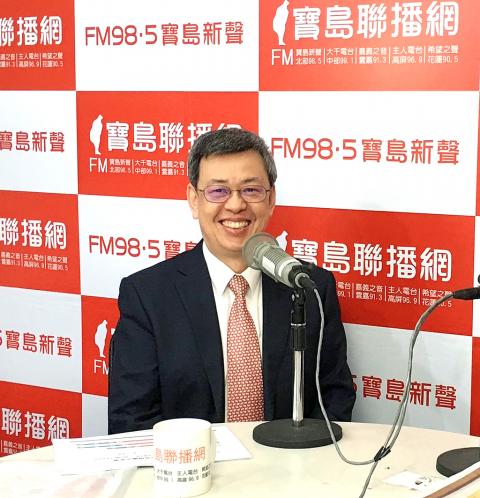The government is to phase out the 18 percent preferential savings rate for retired public-sector employees over a period of six years, Vice President Chen Chien-jen (陳建仁) said yesterday.
In a radio interview, Chen said that the government plans to lower the 18 percent interest rate in stages over six years.
For people taking monthly retirement payments, the rate will be adjusted to 9 percent in the first two years after retirement, then to 6 percent in years three and four and 3 percent in years five and six. There would be no preferential interest rate after that, he said.

Photo: courtesy of Super FM98.5
However, to care for less-well-off retirees, the 18 percent preferential rate would remain for people below a salary floor, which is to be set at either NT$25,000 or NT$32,000 (US$791 or US$1,013) a month, pending further discussions, he said.
Pensioners who take a lump sum would be entitled to higher interest rates, Chen said, without specifying the rate.
The 18 percent preferential interest rate for retired military officials, civil servants and public-school teachers was introduced in 1960 when the average income for the three professions was lower than most other careers.
The government originally planned to scrap the preferential rate, but has decided to take a milder approach, Chen said.
“A pension [fund] is like a feeble goose, which has to lay eggs larger than it can handle every day. There will be no more eggs when it cannot stand anymore and dies,” Chen said. “However, a healthy goose that only has to lay normal-sized eggs can continue [to survive] and give birth to goslings.”
Under the pension system, the pension of a person who begins work at 25 and retires at 55 is only enough to cover 10 years of pension payments, Chen said.
By the age of 65, the person would be receiving pension payments covered by others’ contributions, he said.
With a retirement age of 50, due to the nation’s average life expectancy, women can expect to receive pension payments for 33 years and men for 27 years.
To ensure a sustainable pension system, the retirement age needs to be set at 55 and the income replacement ratio lowered from 80 percent to 60 percent, with the pension contributions of employees and the government raised from 12 percent to 18 percent, Chen said.
Meanwhile, amid accusations that the government has not been transparent in its organization of a national conference on pension reform, which is to be held on Sunday at the Presidential Office Building, Chen said the Presidential Office is always “fair and honest.”
Calling on opponents of the government’s pension reform plans to express their opinions at the conference peacefully, Chen said opponents have mobilized protesters in a “warlike fashion,” which is inappropriate conduct in a democratic society.
Although invited to attend the conference, the Chinese Nationalist Party (KMT), the New Party and the Taiwan Solidarity Union have yet to nominate representatives, Chen said, encouraging the parties to participate.

The CIA has a message for Chinese government officials worried about their place in Chinese President Xi Jinping’s (習近平) government: Come work with us. The agency released two Mandarin-language videos on social media on Thursday inviting disgruntled officials to contact the CIA. The recruitment videos posted on YouTube and X racked up more than 5 million views combined in their first day. The outreach comes as CIA Director John Ratcliffe has vowed to boost the agency’s use of intelligence from human sources and its focus on China, which has recently targeted US officials with its own espionage operations. The videos are “aimed at

STEADFAST FRIEND: The bills encourage increased Taiwan-US engagement and address China’s distortion of UN Resolution 2758 to isolate Taiwan internationally The Presidential Office yesterday thanked the US House of Representatives for unanimously passing two Taiwan-related bills highlighting its solid support for Taiwan’s democracy and global participation, and for deepening bilateral relations. One of the bills, the Taiwan Assurance Implementation Act, requires the US Department of State to periodically review its guidelines for engagement with Taiwan, and report to the US Congress on the guidelines and plans to lift self-imposed limitations on US-Taiwan engagement. The other bill is the Taiwan International Solidarity Act, which clarifies that UN Resolution 2758 does not address the issue of the representation of Taiwan or its people in

US Indo-Pacific Commander Admiral Samuel Paparo on Friday expressed concern over the rate at which China is diversifying its military exercises, the Financial Times (FT) reported on Saturday. “The rates of change on the depth and breadth of their exercises is the one non-linear effect that I’ve seen in the last year that wakes me up at night or keeps me up at night,” Paparo was quoted by FT as saying while attending the annual Sedona Forum at the McCain Institute in Arizona. Paparo also expressed concern over the speed with which China was expanding its military. While the US

SHIFT: Taiwan’s better-than-expected first-quarter GDP and signs of weakness in the US have driven global capital back to emerging markets, the central bank head said The central bank yesterday blamed market speculation for the steep rise in the local currency, and urged exporters and financial institutions to stay calm and stop panic sell-offs to avoid hurting their own profitability. The nation’s top monetary policymaker said that it would step in, if necessary, to maintain order and stability in the foreign exchange market. The remarks came as the NT dollar yesterday closed up NT$0.919 to NT$30.145 against the US dollar in Taipei trading, after rising as high as NT$29.59 in intraday trading. The local currency has surged 5.85 percent against the greenback over the past two sessions, central